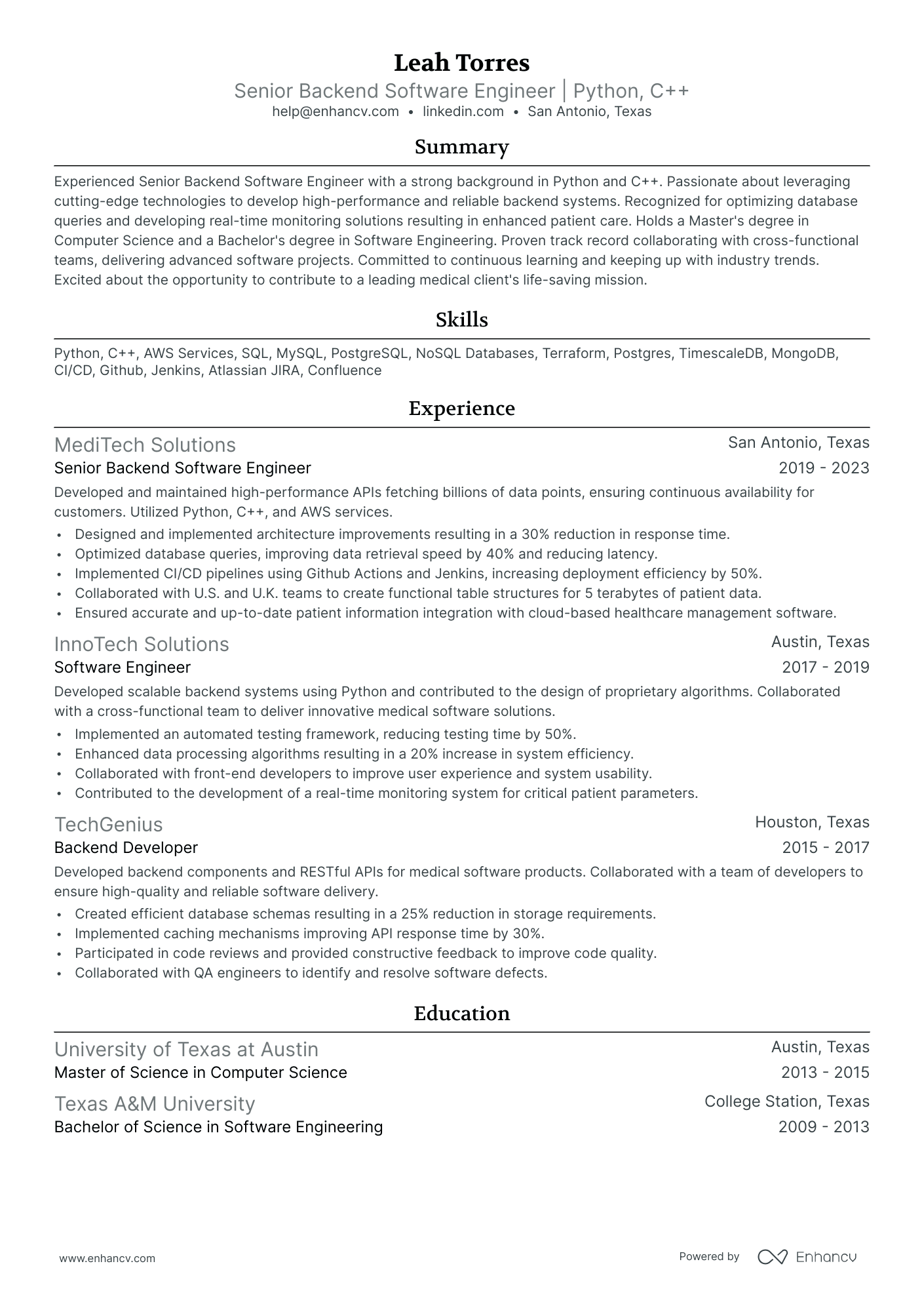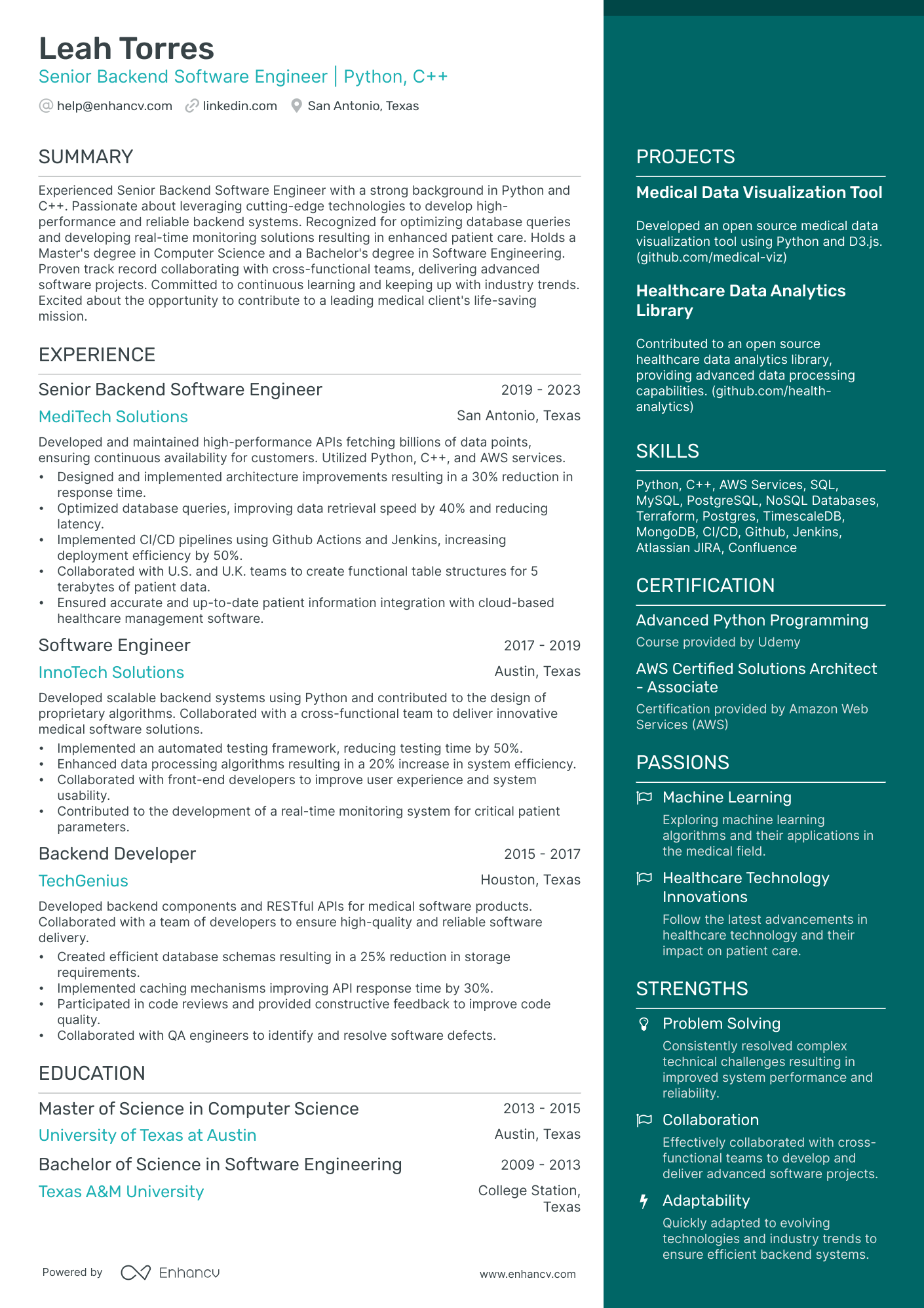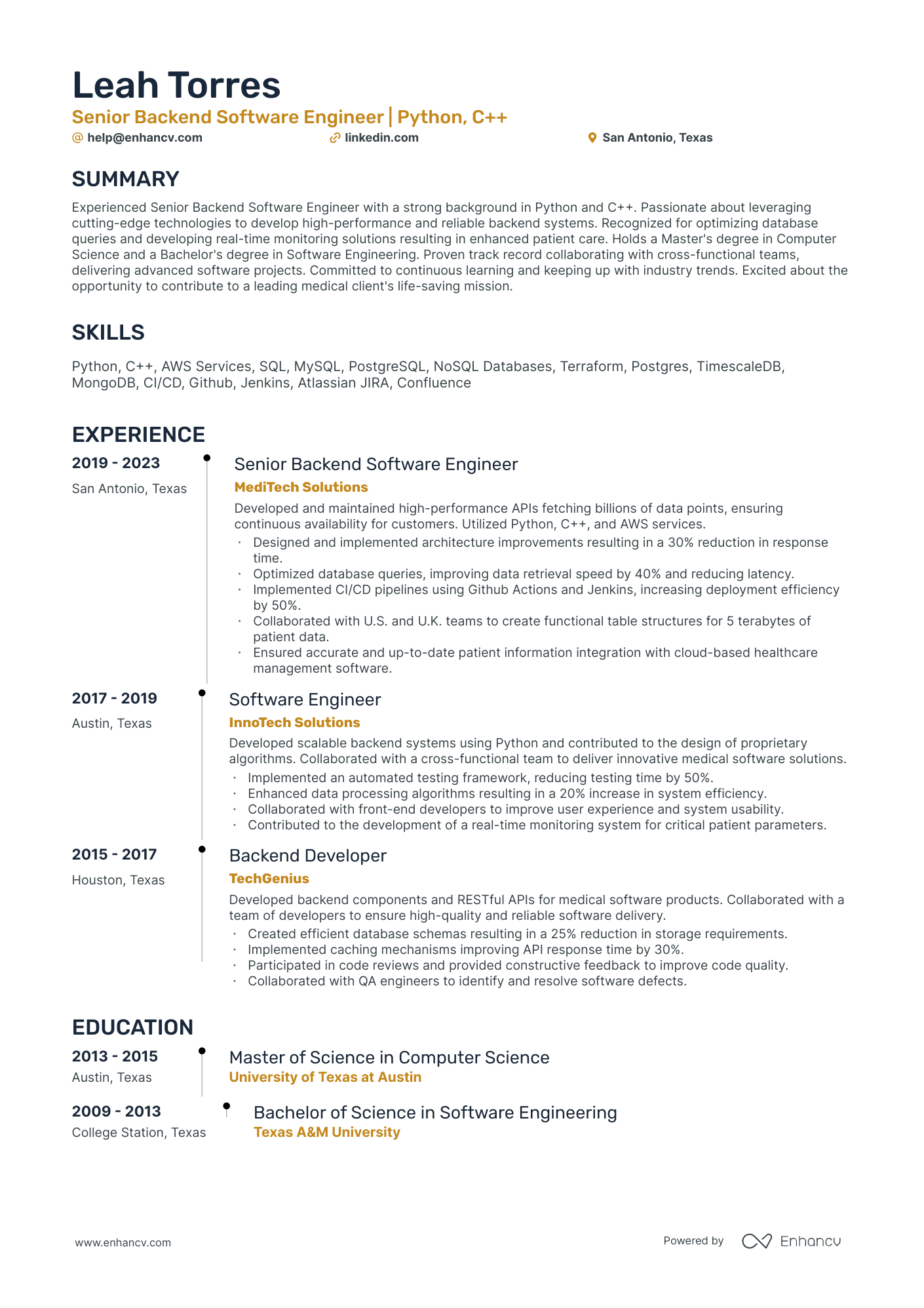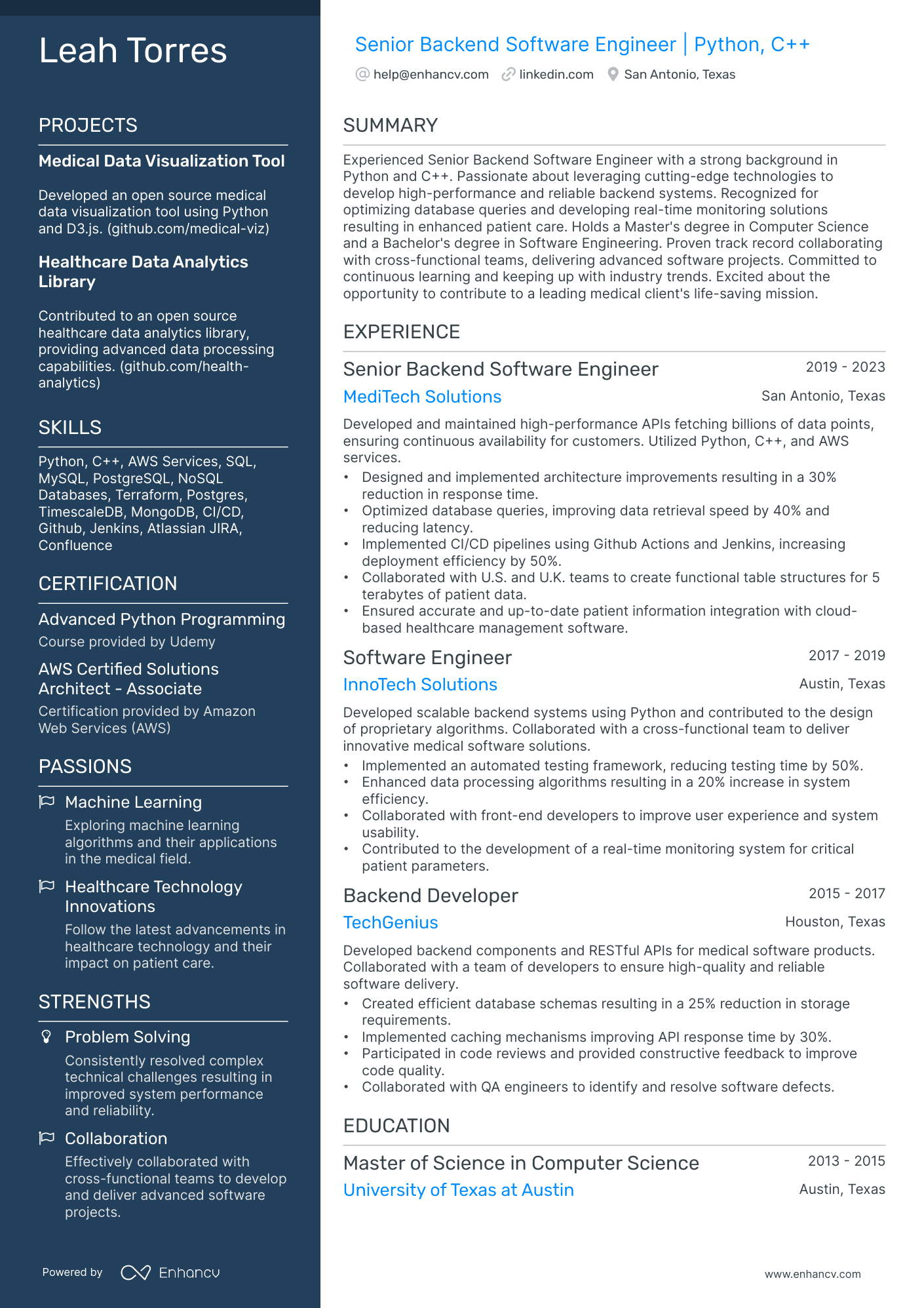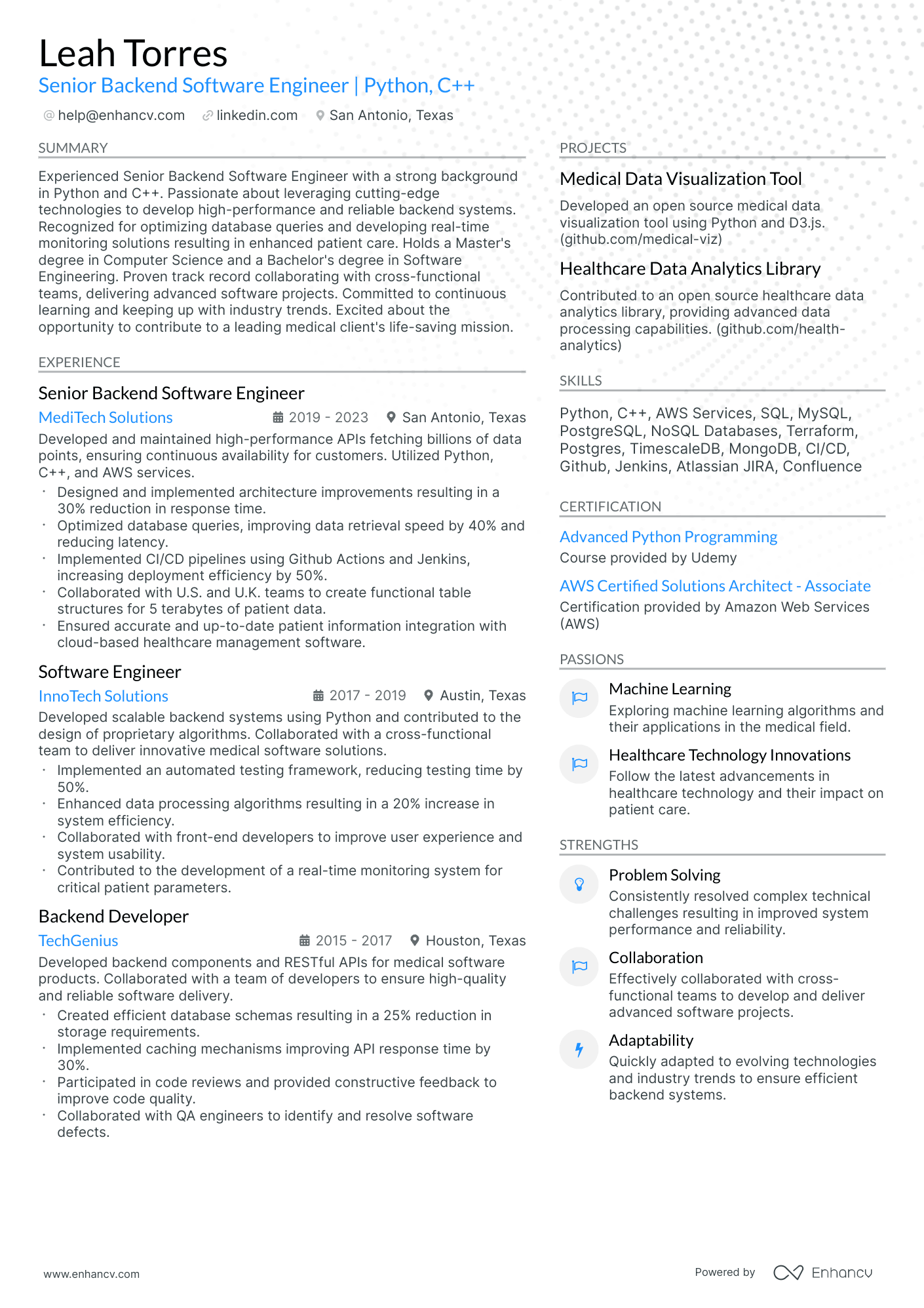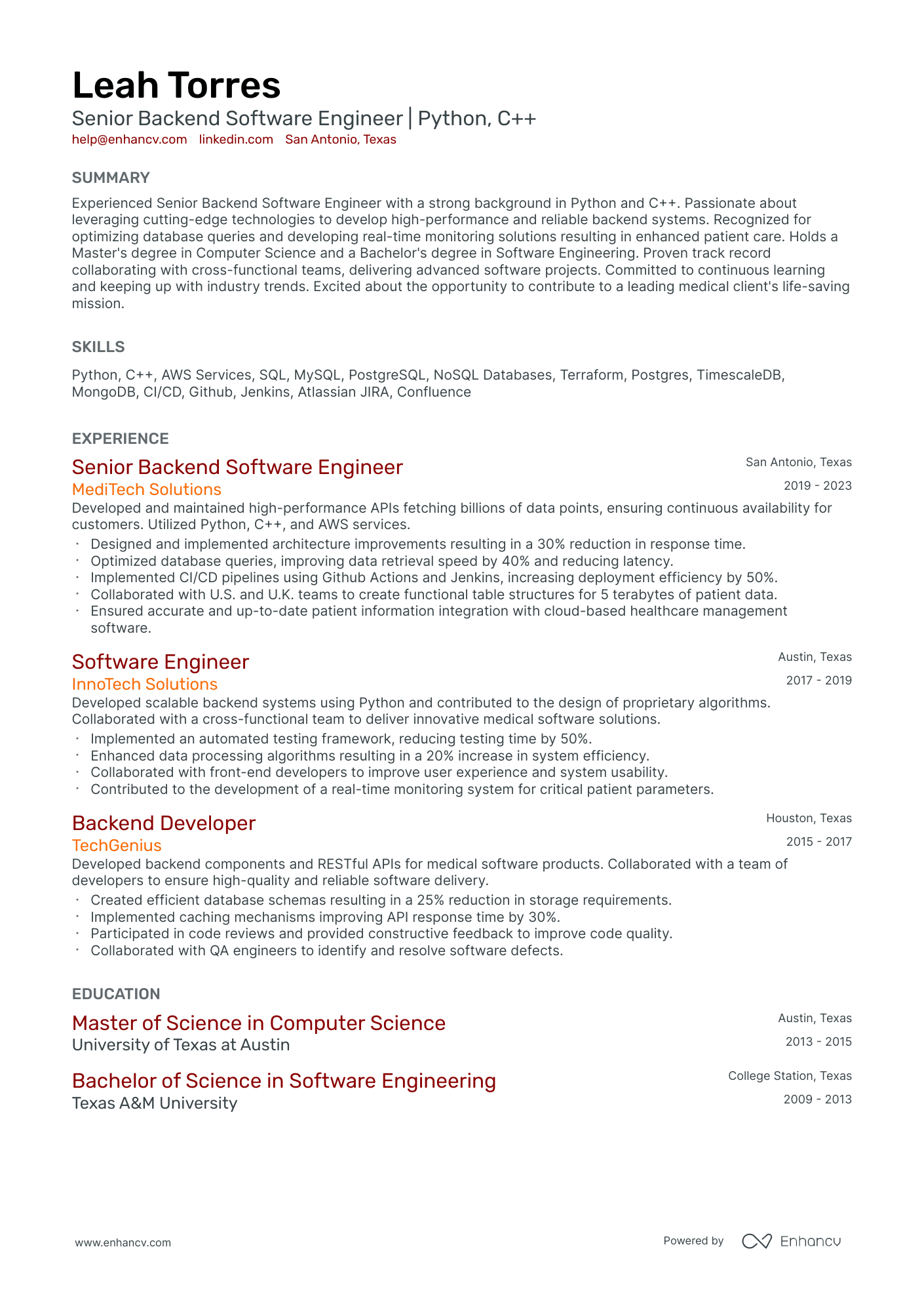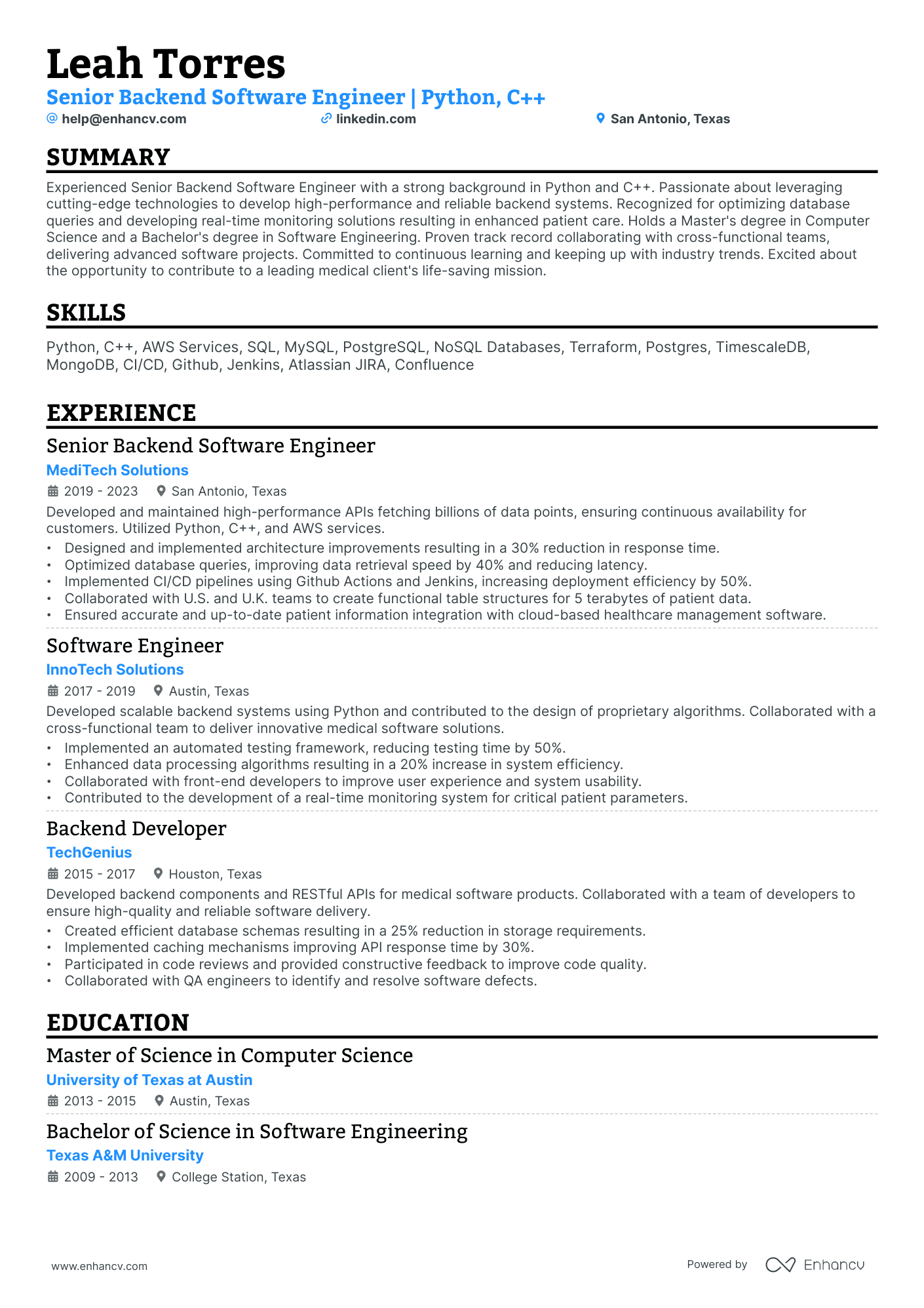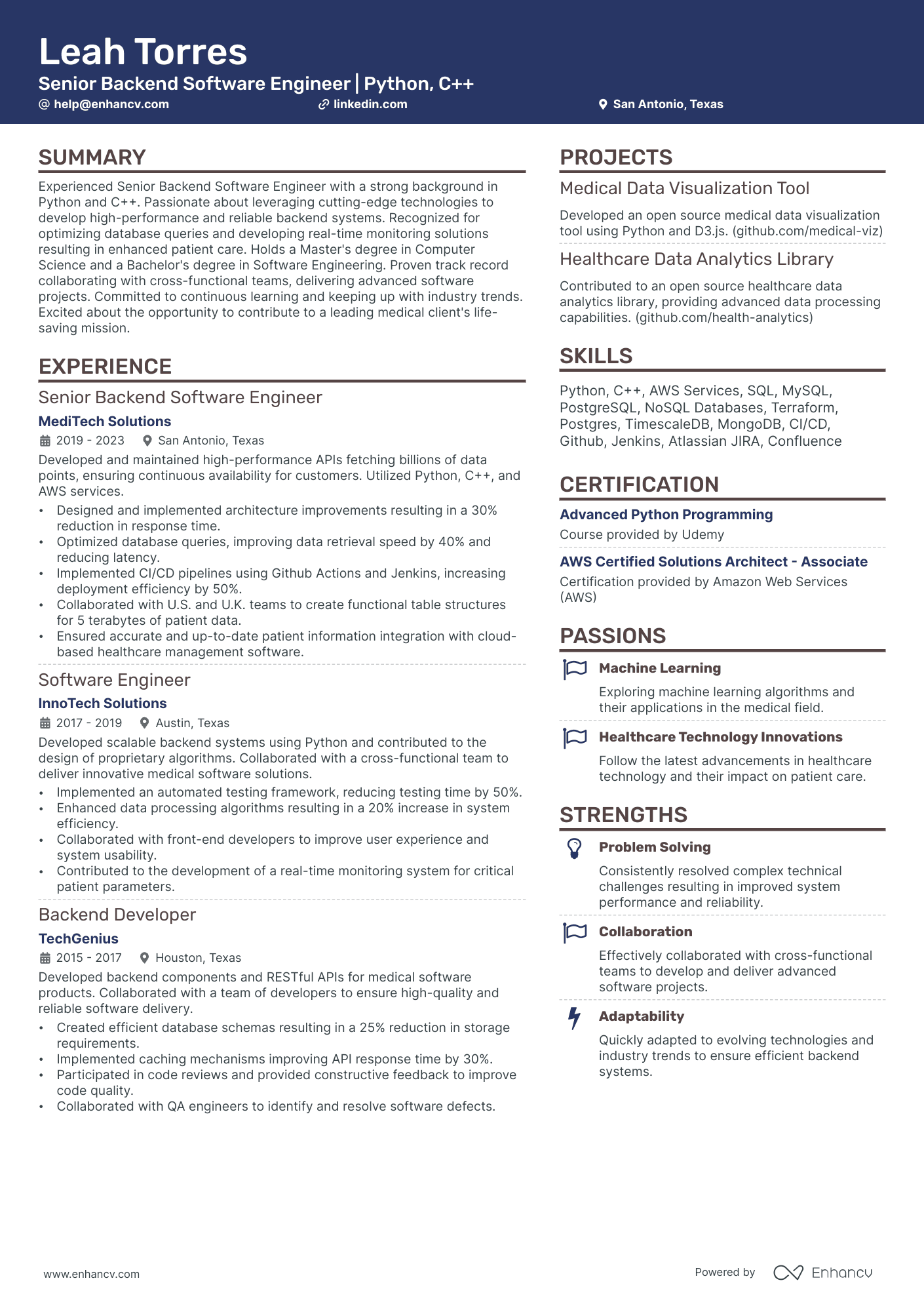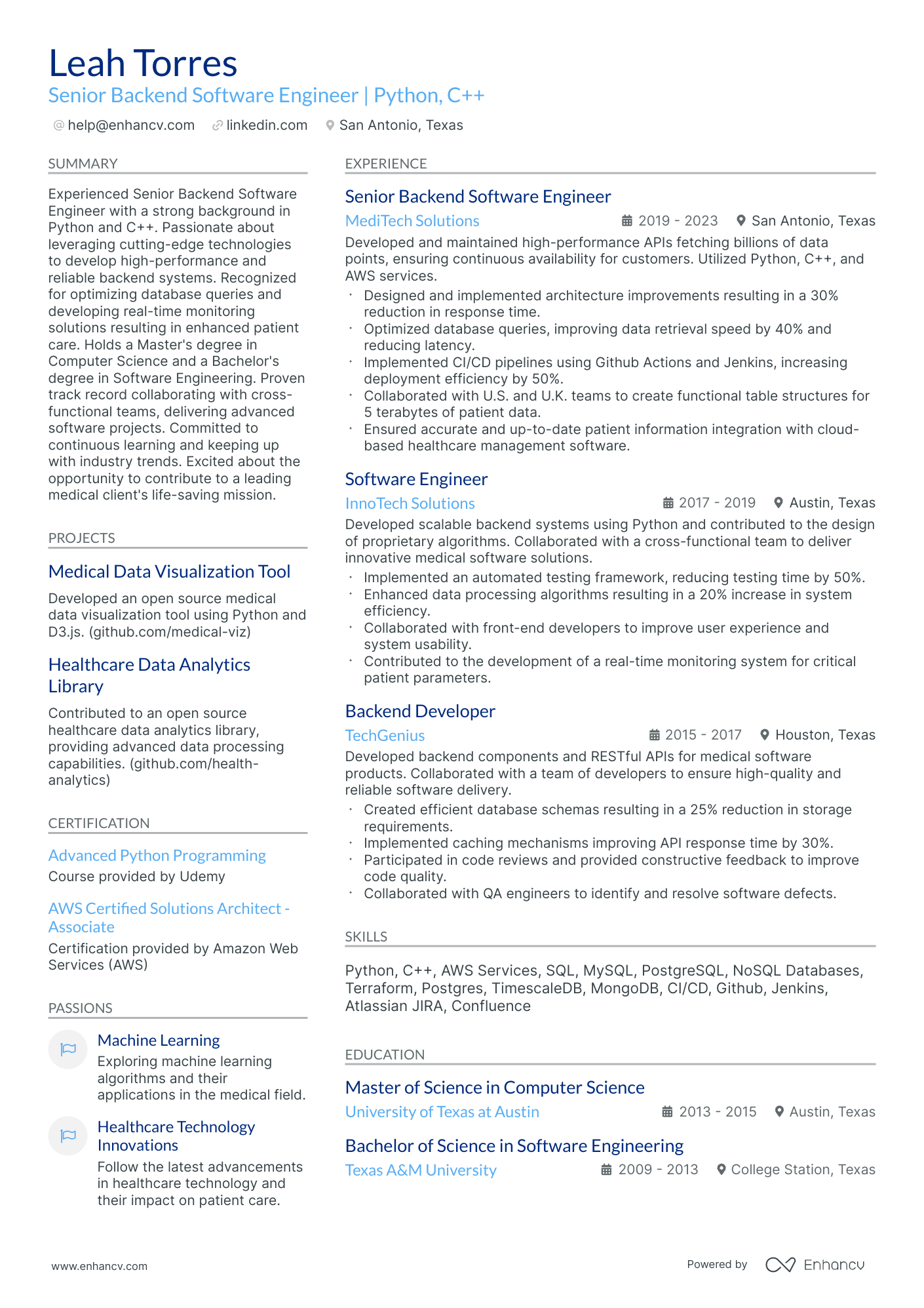A common challenge faced by a lead engineer while crafting their resume is effectively demonstrating leadership skills and technical abilities without overwhelming the reader with overly technical jargon. Our guide can assist in this process by providing clear instructions on how to succinctly communicate complex concepts in layman's terms, ensuring that hiring managers understand your expertise and leadership role, regardless of their technical background.
Dive into our concise guide to learn how to:
- Show your lead engineer career's brightest moments through your resume's summary, objective, and experience sections.
- Explore top-notch lead engineer resume examples to understand how to distinguish yourself from other candidates.
- Identify the most sought-after lead engineer skills and certifications in the industry.
- Design a structured yet unique resume layout.
Recommended reads:
Designing your lead engineer resume: best practices
Before penning down your lead engineer resume, consider its structure and format. Here's what you should remember:
- Employ the reverse-chronological format to present your experience, starting with your most recent role.
- Your resume's header should feature accurate, professional contact details. If you maintain a professional portfolio or LinkedIn profile, include its link.
- Keep your resume concise, ideally within two pages. Prioritize relevance over length.
- Unless directed otherwise, save your resume as a PDF to preserve its design.
Upload your resume
Drop your resume here or choose a file. PDF & DOCX only. Max 2MB file size.
Pro tip
Consider incorporating design elements like icons or charts to enhance your resume's visual appeal and readability. But remember, the key is subtlety; don't let design overshadow content.
The five (plus) definite sections your resume for a lead engineer job should include are:
- Header with your headline, contact details, and/or a preview of your work
- Summary (or objective) to pinpoint how your success aligns with the role
- Experience with bullets of your most relevant achievements in the field
- Skills to integrate vital job requirements (both technical and personal)
- Your further dedication to the field, showcased via relevant higher education and/or certifications
What recruiters want to see on your resume:
- Technical Proficiency: Demonstrated knowledge and expertise in relevant engineering fields such as mechanical, electrical, software, or civil engineering. Certifications and mastery of tools like CAD, Matlab, Python, etc., depending on the specific role.
- Leadership Skills: Evidence of successfully leading teams on technical projects, ability to mentor junior engineers, decision-making capabilities and conflict resolution skills.
- Project Management: Experience in overseeing projects from conception to completion, including managing timelines, resources, and budgets. Certification in project management methodologies like Agile or PMP can be an advantage.
- Problem Solving: Ability to troubleshoot and solve complex engineering problems, demonstrated by specific instances where innovative solutions were applied.
- Communication Skills: Clear evidence of effective communication, both written and verbal, for technical and non-technical audiences alike. This includes the ability to liaise with stakeholders, prepare reports, and present findings.
Recommended reads:
Optimizing the experience section of your lead engineer resume
The experience section is pivotal—it bridges the gap between your qualifications and the job's requirements.
To craft an impactful lead engineer experience section, consider these guidelines:
- Review the job posting to identify key requirements and align your past roles with these needs.
- Go beyond listing skills—demonstrate their impact through quantifiable achievements.
- Exclude roles that don't enhance your application or showcase relevant skills.
- While technical expertise is crucial, also highlight soft skills that add value to your role.
- Use action verbs to articulate your accomplishments and the skills employed to achieve them.
Below, we've provided lead engineer resume samples to inspire your experience section, ensuring it adheres to industry best practices.
- Led a team of engineers in developing and implementing innovative solutions resulting in a 20% increase in production efficiency.
- Designed and executed complex engineering projects, meeting strict deadlines and quality standards, resulting in cost savings of $500,000 annually.
- Collaborated with cross-functional teams to develop cutting-edge technologies and streamline processes, resulting in a 30% reduction in time-to-market for new products.
- Implemented continuous improvement initiatives, optimizing manufacturing processes and reducing waste by 15%.
- Provided technical guidance and mentorship to junior engineers, fostering their professional development and improving team productivity.
- Managed a team of engineers and oversaw the successful completion of multiple large-scale projects, resulting in substantial revenue growth.
- Developed and implemented strategic plans to improve product reliability, resulting in a 25% decrease in customer complaints.
- Led the integration of new technologies into existing systems, enhancing performance and functionality.
- Collaborated with stakeholders to define project requirements and milestones, ensuring timely delivery within allocated budgets.
- Performed risk assessments and developed mitigation strategies, minimizing potential project delays and ensuring on-time delivery.
- Designed and implemented scalable solutions that improved system performance by 40% and reduced downtime by 50%.
- Coordinated cross-functional teams and managed project schedules, resulting in a 15% increase in overall efficiency.
- Led the development of a new product line, resulting in a revenue increase of $2 million within the first year of launch.
- Collaborated with customers to understand their requirements and provided technical expertise, leading to successful project implementations.
- Developed and maintained strong relationships with key stakeholders, ensuring customer satisfaction and repeat business.
- Managed a team of engineers in the design and implementation of complex systems, resulting in improved operational efficiency.
- Developed and executed testing procedures to ensure product quality and compliance with industry standards.
- Led the troubleshooting and resolution of critical technical issues, minimizing downtime and maintaining customer satisfaction.
- Collaborated with cross-functional teams to optimize manufacturing processes, reducing production costs by 10%.
- Provided technical support to sales and marketing teams, contributing to the successful acquisition of new clients.
- Designed and implemented innovative solutions to enhance product functionality, resulting in increased market share.
- Managed project budgets and resource allocation, ensuring projects were delivered within financial constraints.
- Collaborated with suppliers and vendors to source components and negotiate favorable contracts, optimizing cost savings.
- Developed and maintained engineering documentation, ensuring compliance with regulatory requirements.
- Identified process improvement opportunities and led initiatives to streamline operations, resulting in a 20% reduction in lead time.
- Led a team of engineers in the development of complex software systems, resulting in improved performance and reliability.
- Designed and implemented scalable architectures to support high-volume data processing, achieving 99.9% uptime.
- Collaborated with product management to define technical requirements and prioritize feature development.
- Implemented Agile methodologies, increasing team productivity by 30% and enabling faster delivery of key milestones.
- Developed and maintained coding standards and best practices, ensuring high-quality code and efficient development processes.
- Managed a team of software engineers in the design and implementation of mobile applications, resulting in millions of downloads.
- Led the integration of third-party APIs and services, enhancing application functionality and user experience.
- Collaborated with UX/UI designers to create intuitive interfaces and improve app usability.
- Implemented automated testing frameworks, reducing regression issues by 50% and improving overall software quality.
- Participated in code reviews and mentored junior engineers, fostering a culture of continuous learning and improvement.
- Designed and developed complex algorithms for real-time data analytics, enabling actionable insights and informed decision-making.
- Led a team of data scientists and engineers in the implementation of machine learning models, resulting in predictive analytics capabilities.
- Collaborated with cross-functional teams to define data requirements and develop scalable data infrastructure solutions.
- Implemented data governance policies and ensured compliance with data privacy regulations.
- Contributed to patent applications for innovative data analysis techniques, driving intellectual property growth.
- Managed database administration and optimization tasks, improving system performance by 30%.
- Designed and implemented disaster recovery plans, ensuring business continuity in case of system failures.
- Collaborated with development teams to design efficient database schemas and optimize query performance.
- Implemented data security measures, ensuring compliance with industry standards and protecting sensitive information.
- Provided technical support to resolve database-related issues, minimizing downtime and maintaining data integrity.
- Lead a team of engineers in developing and executing cybersecurity strategies, safeguarding critical systems and protecting against cyber threats.
- Performed vulnerability assessments and penetration tests to identify potential weaknesses and recommend remediation measures.
- Collaborated with cross-functional teams to ensure compliance with industry security standards and regulations.
- Developed incident response plans and led investigations into security incidents, minimizing the impact on operations.
- Provided training and awareness programs to educate employees about cybersecurity best practices and mitigate risks.
Quantifying impact on your resume
<ul>
Tips for lead engineer newcomers launching their careers
Lacking extensive experience for that lead engineer role? No worries.
Sometimes, hiring managers go for the unexpected candidate when they see potential.
Here's how to convince them you're the right fit:
- Opt for the functional skill-based or hybrid formats to highlight your unique professional value.
- Always tailor your lead engineer resume to emphasize the most critical requirements, usually listed at the top of the job ad.
- Compensate for limited experience with other relevant sections like achievements, projects, and research.
- In your lead engineer resume objective, pinpoint both your achievements and how you envision your role in the position.
Recommended reads:
Pro tip
Ensure your lead engineer experience descriptions resonate with both tech-savvy and non-tech audiences. Adopting a consistent format, such as task-action-result, can lend clarity and coherence to your experience section.
How to create an impactful lead engineer resume skills section
Recruiters always care about the skill set you'd bring about to the lead engineer role. That's why it's a good idea to cherry pick yours wisely, integrating both hard (or technical) and soft skills.
Hard skills are gained through studying, are certifiable, and it's impossible to do your job without them. All in all, they show your suitability for the technical aspect of the role.
Your soft skills are those personality traits you've gained over time and most often than not - outside of the workplace. Soft skills are more difficult to quantify but are definitely worth it - as they show how you'll fit and adapt into a new team environment.
How do you build the skills section of your resume?
- Include up to five or six skills in the section as keywords to align with the advert.
- Create a specific technical skills section to highlight your hard skills aptitude.
- Read more about the culture of the company you're applying and cherry pick the soft skills you have that deserve a mention.
- Make sure you answer the majority of the job requirements that are in the advert within your skills section.
A lead engineer's resume requires a specific skill set that balances both industry-specific hard skills with personal, soft skills. Discover the most often used ones on lead engineer resumes from our list:
Top skills for your lead engineer resume:
Python
Java
C++
Docker
Kubernetes
AWS
Microservices Architecture
RESTful APIs
CI/CD Tools
Git
Leadership
Communication
Problem-Solving
Teamwork
Adaptability
Critical Thinking
Time Management
Mentoring
Conflict Resolution
Decision Making
Pro tip
When detailing your skills, align them with the job's requirements. Emphasize unique technical proficiencies and provide examples of your soft skills in action.
how to properly list your resume's education and certifications
Don't underestimate the importance of your resume education section , as it oftentimes helps you further tailor your resume to the job ad.
When writing your education section:
- Include the most relevant degree you have with information about the institution and dates of start and completion;
- If you're in the process of obtaining your degree, include your expected graduation date;
- Consider leaving off degrees that aren't relevant to the job or industry;
- Add bullet points to show how you gained valuable experience relevant for the job in an academic environment.
When describing your resume certifications , always consider their relevancy to the role.
Use the same format to describe them as you will for your education. If you're wondering what are the best certificates for lead engineer roles, check out the list below.
Best certifications to list on your resume
- CompTIA Security+ - CompTIA
- Certified Information Systems Security Professional (CISSP) - (ISC)²
- AWS Certified Solutions Architect – Associate - Amazon Web Services (AWS)
- Certified Kubernetes Administrator (CKA) - The Linux Foundation
- Oracle Certified Professional, Java SE Programmer (OCPJP) - Oracle
- Certified Information Security Manager (CISM) - ISACA
Pro tip
If a particular certification is highly valued in the industry or by the company, consider highlighting it in your resume's headline.
Recommended reads:
Choosing between a resume summary or objective based on your experience
The relevance of a resume summary or a resume objective for your lead engineer application hinges on your experience.
Both provide a snapshot of your expertise and accomplishments. However:
- A resume objective emphasizes your career aspirations, ideal for candidates looking to balance their experience with future goals.
- A resume summary offers a space to detail your unique value and notable accomplishments, perfect for candidates with a rich career history.
Ensure your introduction aligns with the job description, and if possible, quantify details for a compelling narrative.
Resume summary and objective examples for a lead engineer resume
Additional sections to elevate your lead engineer resume
Recruiters often seek candidates who offer more than just the basics.
To stand out, consider adding:
- Interests: Share hobbies or activities that reveal your personality and transferable skills.
- Projects: Highlight innovative work that showcases your expertise.
- Languages: If communication is vital for the role, showcase your linguistic abilities.
- Awards: Feature significant recognitions that underscore your expertise.
Key takeaways
- Your resume's layout should be both visually appealing and content-rich.
- Emphasize achievements that resonate with the job's requirements.
- Detail your skills, both technical and interpersonal, with real-world examples.
- Ensure the top section of your resume provides a clear snapshot of who you are and what you offer.
- When detailing experience, focus on tasks, actions, and their outcomes.
